From O City of Byzantium by Niketas Choniates
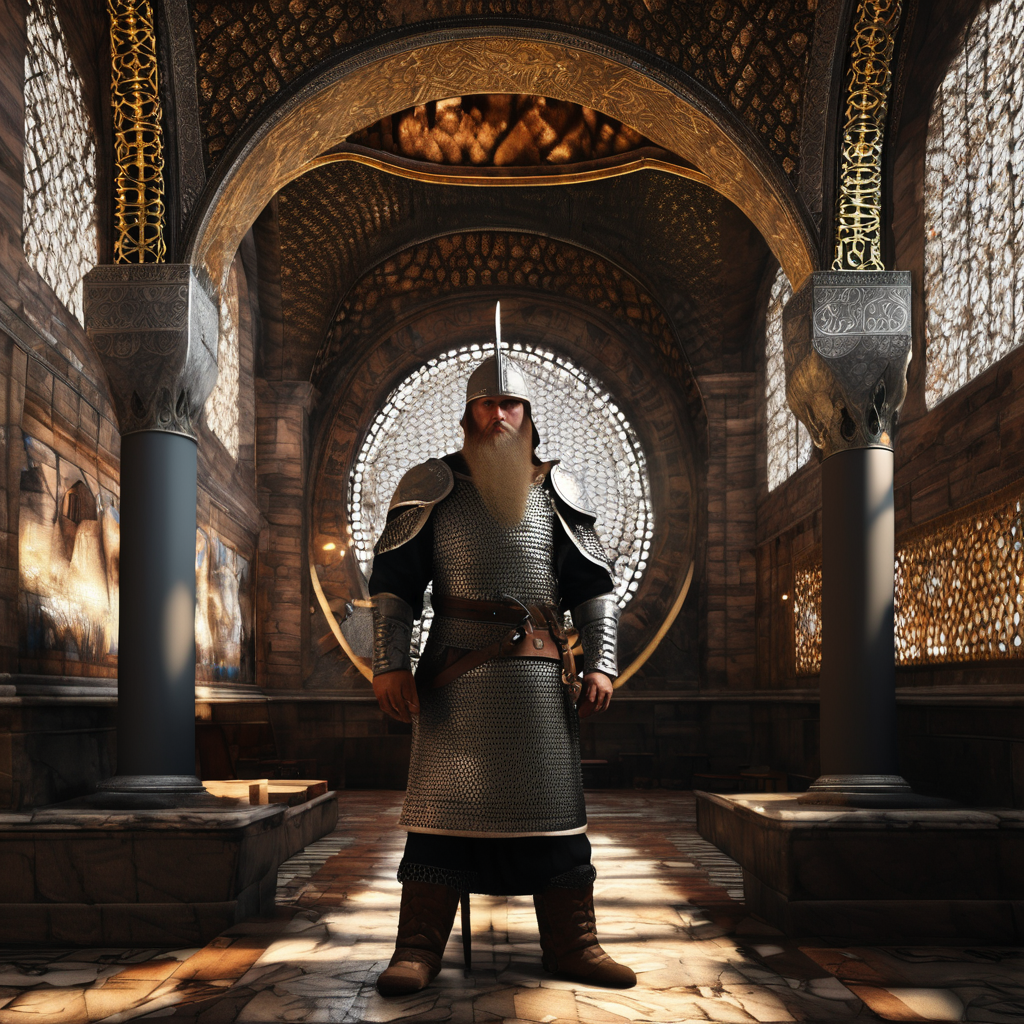 But, as I was saying, as the symptoms of the emperor's disease worsened, he rashly made use of the bathing room; there, he saw that, like the water, his hopes for continued life were being washed away. He briefly discussed his son Alexios with those in attendance, and, foreseeing the events that would follow his death, he intermixed his words with lamentations.
But, as I was saying, as the symptoms of the emperor's disease worsened, he rashly made use of the bathing room; there, he saw that, like the water, his hopes for continued life were being washed away. He briefly discussed his son Alexios with those in attendance, and, foreseeing the events that would follow his death, he intermixed his words with lamentations.
On the advice of the patriarch, he renounced his earlier trust in astrology.
Finally, placing his hand on an artery to take his own pulse, he sighed deeply, struck his thigh with his hand, and asked for the monastic habit. As was to be expected, these words raised a confused clamor. No provision had been made for monastic garb, but the emperor's attendants managed to procure from somewhere a black threadbare cloak. They removed his soft royal vestments and dressed him in the coarse habit of the life in God, converting him into a spiritual soldier with a more divine helmet and a more holy breastplate, and enrolled him in the army of the Heavenly Ruler. The tattered garment, which neither reached to the feet nor covered the whole body, left the knees bare so that no one why' witnessed the scene remained without fear as he reflected on human frailty at the end of life and the wretchedness of the body cast around us like an oyster shell and united with the soul.
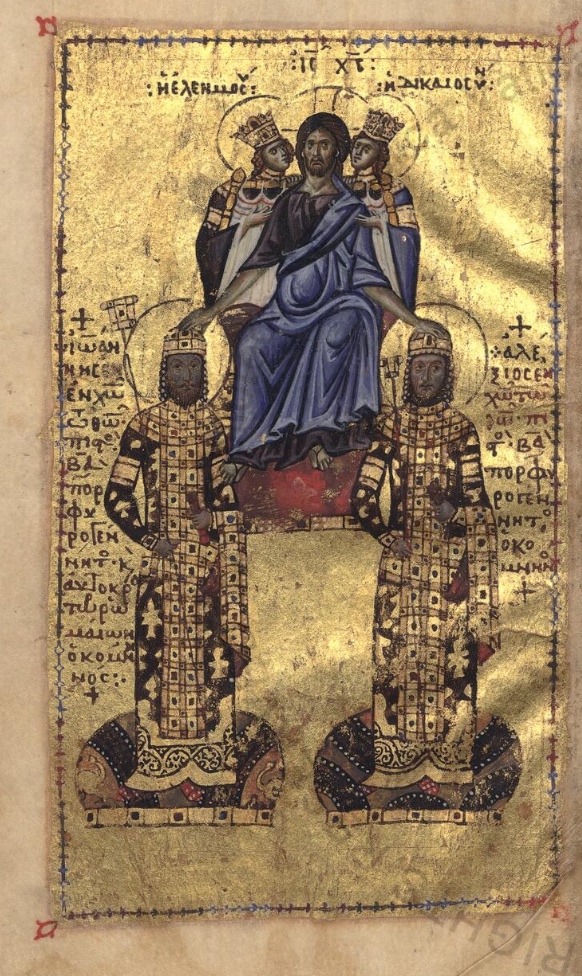 Thus, he departed this life and the throne in the thirty-eighth year of his reign less three months [24 September 1180]. I think that the lengthy duration of his reign can be explained by that ancient adage which states, "but the last syllable of the word shall bring you profit." The last syllable of his name stands for the number thirty-eight.
Thus, he departed this life and the throne in the thirty-eighth year of his reign less three months [24 September 1180]. I think that the lengthy duration of his reign can be explained by that ancient adage which states, "but the last syllable of the word shall bring you profit." The last syllable of his name stands for the number thirty-eight.
He was buried beside the entrance to the church of the Monastery of the Pantokrator, not in the temple itself but in the shrine attached to it. Where the church wall led round to an arch, a broad entrance way was opened around the sepulcher, which was faced with marble of a black hue, gloomy in appearance, and was divided into seven lofty sections. To the side, resting on a base, was a slab of red marble the length of a man which received veneration; it was formerly located in the church of [St. John _the Evangelist] Ephesos and was commonly reported to be that on which Christ was washed with myrrh and wrapped in burial linen clothes after he had been taken down from the cross. This emperor had it taken out of the church, and, placing it on his back, he carried it up from the harbor of Boukoleon to the church in the lighthouse of the palace [Pharos]... as though it were the actual body of God conveying its grace on him. Not long after the emperor's death, the marble slab was removed from the palace to the place described above with proclamations, I believe, that declared loudly all the feats for which he who lay silent in the tomb had labored and struggled so hard to achieve.
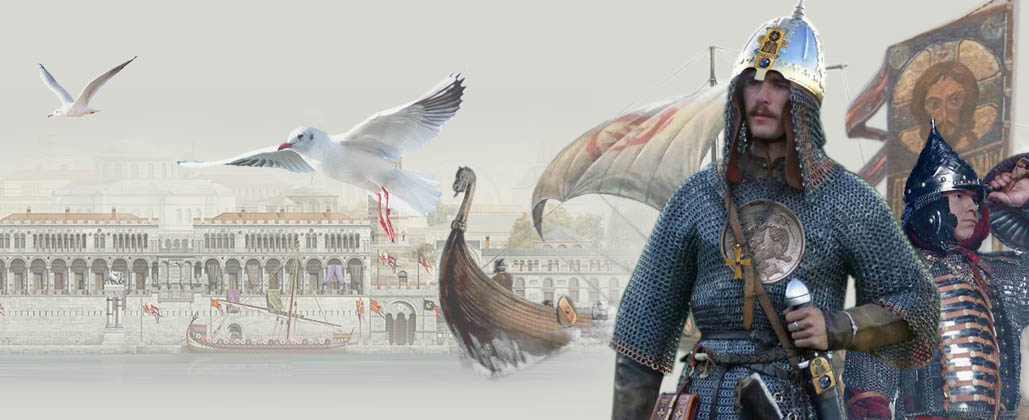 FOLLOWING Manuel Komenos, who died in this manner, his son Alexios, who had barely reached puberty and was still in need of pedaogues and nursemaids, reigned.The affairs of the Romans were borne on an errant and helpless course, worse even than that of Phaethon, who attempted to cleave a path through the starry sky when he had mounted his father's gold-studded chariot . The emperor, a mere adolescent who lacked an understanding of those things that are expedient, paid no attention to any of his duties, for he had been nurtured on soft airs, and, not having learned for certain what joy and sorrow are, he became a votary of the hunt and a devotee of the chariot races; he kept company with his fellow playmates, and his character was imprinted with the worst qualities. Indeed, his father's companions and blood relatives, attending to other matters, neglected to provide him with the finest education and upbringing and did not notice the ruination of public affairs. Some of these men passionately desired the empress and wooed her. Eagerly seeking to win her love in return, they arranged their hair in charming curls, rubbed themselves with sweet oils as though they were infants, and effeminately wore necklaces set with precious gems, all the while looking on her longingly." Others, being avaricious and rapacious, stealthily appropriated public revenues by finding ways to spend lavishly, as well as finding new extravagances in which to indulge so that their purses which yesterday were empty and drawn tight today were full and bulging. Yet others, who craved to sit on the throne, directed all their energies to this purpose. For just as confusion reigns everywhere with the overthrow of a noble-minded and earnest leader, as when a column is removed from its firm and steadfast base the whole structure leans in the opposite direction, so did each pursue his own end, and all conspired against one another. And as equality of privilege was no longer esteemed by the great and powerful and by the emperor's kinsmen, concern over the affairs of state dissipated and assemblies and councils disappeared.<P>
FOLLOWING Manuel Komenos, who died in this manner, his son Alexios, who had barely reached puberty and was still in need of pedaogues and nursemaids, reigned.The affairs of the Romans were borne on an errant and helpless course, worse even than that of Phaethon, who attempted to cleave a path through the starry sky when he had mounted his father's gold-studded chariot . The emperor, a mere adolescent who lacked an understanding of those things that are expedient, paid no attention to any of his duties, for he had been nurtured on soft airs, and, not having learned for certain what joy and sorrow are, he became a votary of the hunt and a devotee of the chariot races; he kept company with his fellow playmates, and his character was imprinted with the worst qualities. Indeed, his father's companions and blood relatives, attending to other matters, neglected to provide him with the finest education and upbringing and did not notice the ruination of public affairs. Some of these men passionately desired the empress and wooed her. Eagerly seeking to win her love in return, they arranged their hair in charming curls, rubbed themselves with sweet oils as though they were infants, and effeminately wore necklaces set with precious gems, all the while looking on her longingly." Others, being avaricious and rapacious, stealthily appropriated public revenues by finding ways to spend lavishly, as well as finding new extravagances in which to indulge so that their purses which yesterday were empty and drawn tight today were full and bulging. Yet others, who craved to sit on the throne, directed all their energies to this purpose. For just as confusion reigns everywhere with the overthrow of a noble-minded and earnest leader, as when a column is removed from its firm and steadfast base the whole structure leans in the opposite direction, so did each pursue his own end, and all conspired against one another. And as equality of privilege was no longer esteemed by the great and powerful and by the emperor's kinsmen, concern over the affairs of state dissipated and assemblies and councils disappeared.<P>
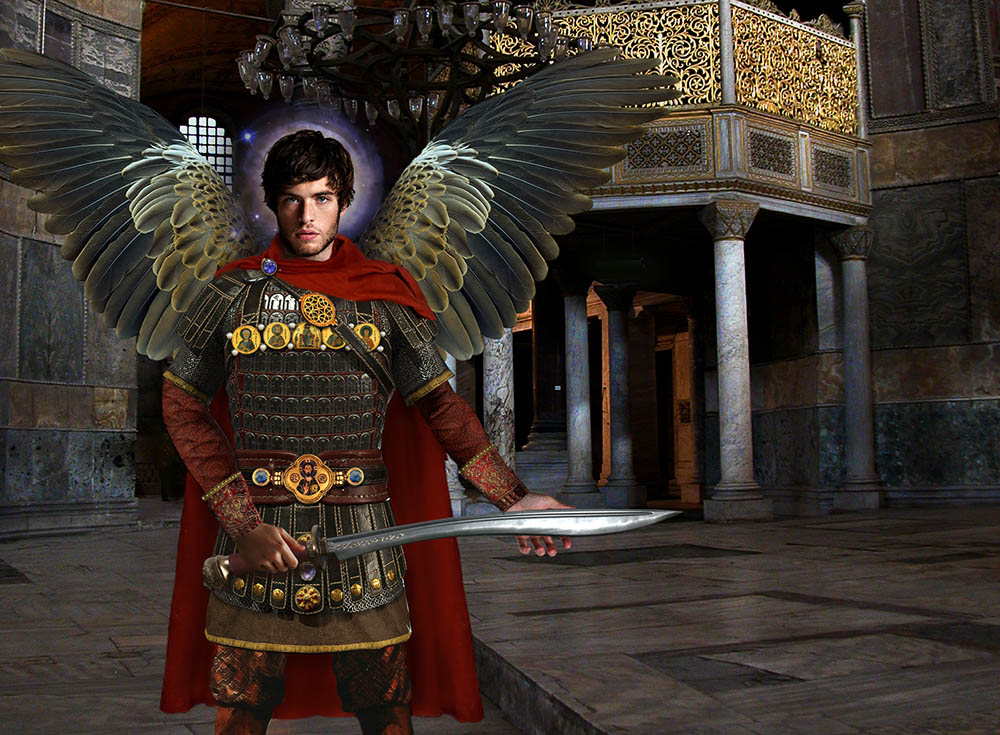
When, as it was said, the protosebastos and protovestiarios Alexios Komnenos, Emperor Manuel's nephew on his father's side, had sexual relations with the young emperor's mother and often consorted with her, thus coming to prevail over all others, those blood relations who had been made equal in power by Emperor Manuel and were distinguished by the highest rank were choked with vexation. Seeing tyranny take root, they distrusted the protosebastos, not so much because the emperor might suffer some harm, but because they feared that they themselves might be apprehended. Anxious for the future because of these developments, they were concerned to save themselves from the present danger. Indeed, the rumor was already being bruited about, that Alexios was having sexual intercourse with the emperor's mother and that he planned to depose the young monarch, to mount both mother and throne.
Thus the empire was racked with total confusion and every kind of stormy calamity; the state of affairs could be likened to the myth of the serpent who inflicted damage as he dragged along the deaf and blind hindpart of his body. The portent which appeared when Emperor Manuel was departing this life was fulfilled: a certain woman who resided on the banks of the Propontis had given birth to a male child with a deformed and tiny body and the head a large and extraordinary thing. This was interpreted to be the sign of Polyarchy, the mother of Anarchy.
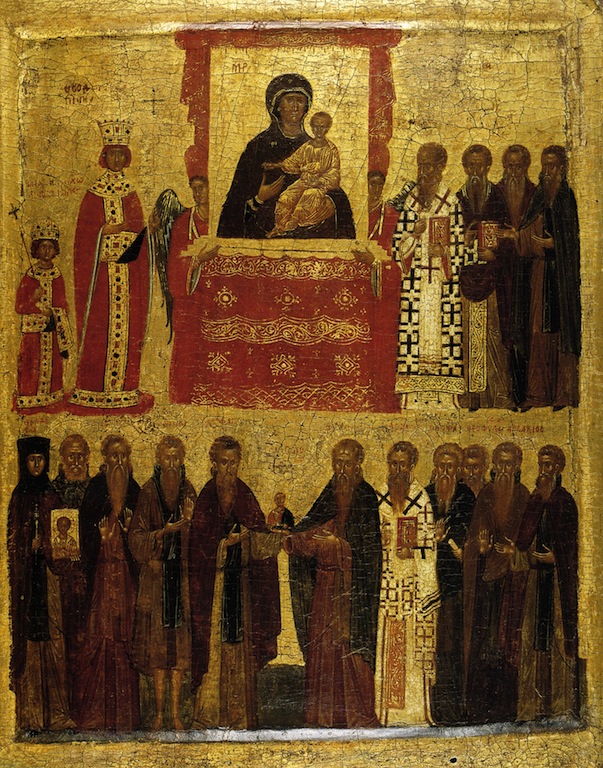 But while called thus to deplore the removal of many of its valued relics, the Pantokrator came during the Latin period into possession of a sacred object which compensated the house abundantly for all losses of that kind. The church became the shrine of the ikon of the Theotokos Hodegetria. No relic was held in higher estimation. It was considered to be the portrait of the mother of our Lord painted by S. Luke, and was brought from Jerusalem to Constantinople by the Empress Eudocia, wife of Theodosius II., as a present to her sister-in-law Pulcheria. It led the hosts of the Empire to victory, and shared the honours of their triumphal entry into the capital. When enemies besieged the city, the ikon was carried in procession through the streets and around the fortifications, or was placed near the post of danger. After the capture of the city by the Latins the picture was first taken to S. Sophia, then the cathedral of the Venetian patriarchs of Constantinople. But the Venetian clergy of the Pantokrator claimed the sacred picture as their own, in virtue of a promise made to them by the Emperor Henry; and when their claim was ignored, they persuaded the podesta of the Venetian community to break into S. Sophia and seize the eikon by force. In vain did the patriarch appear upon the scene with candle and bell to excommunicate the podesta, his council, and his agents for the sacrilegious act. The coveted prize was borne off in triumph to the Pantokrator. In vain did the Papal Legate in the city confirm the excommunication of the guilty parties, and lay their churches under interdict. In vain were those penalties confirmed by the Pope himself. The ikon kept its place in the Pantokrator notwithstanding all anathemas until the fall of the Latin Empire, when it was removed from the church to lead the procession which came through the Golden Gate on the 15th August 1261, to celebrate the recovery of Constantinople by the Greeks.
But while called thus to deplore the removal of many of its valued relics, the Pantokrator came during the Latin period into possession of a sacred object which compensated the house abundantly for all losses of that kind. The church became the shrine of the ikon of the Theotokos Hodegetria. No relic was held in higher estimation. It was considered to be the portrait of the mother of our Lord painted by S. Luke, and was brought from Jerusalem to Constantinople by the Empress Eudocia, wife of Theodosius II., as a present to her sister-in-law Pulcheria. It led the hosts of the Empire to victory, and shared the honours of their triumphal entry into the capital. When enemies besieged the city, the ikon was carried in procession through the streets and around the fortifications, or was placed near the post of danger. After the capture of the city by the Latins the picture was first taken to S. Sophia, then the cathedral of the Venetian patriarchs of Constantinople. But the Venetian clergy of the Pantokrator claimed the sacred picture as their own, in virtue of a promise made to them by the Emperor Henry; and when their claim was ignored, they persuaded the podesta of the Venetian community to break into S. Sophia and seize the eikon by force. In vain did the patriarch appear upon the scene with candle and bell to excommunicate the podesta, his council, and his agents for the sacrilegious act. The coveted prize was borne off in triumph to the Pantokrator. In vain did the Papal Legate in the city confirm the excommunication of the guilty parties, and lay their churches under interdict. In vain were those penalties confirmed by the Pope himself. The ikon kept its place in the Pantokrator notwithstanding all anathemas until the fall of the Latin Empire, when it was removed from the church to lead the procession which came through the Golden Gate on the 15th August 1261, to celebrate the recovery of Constantinople by the Greeks.
 But, as I was saying, as the symptoms of the emperor's disease worsened, he rashly made use of the bathing room; there, he saw that, like the water, his hopes for continued life were being washed away. He briefly discussed his son Alexios with those in attendance, and, foreseeing the events that would follow his death, he intermixed his words with lamentations.
But, as I was saying, as the symptoms of the emperor's disease worsened, he rashly made use of the bathing room; there, he saw that, like the water, his hopes for continued life were being washed away. He briefly discussed his son Alexios with those in attendance, and, foreseeing the events that would follow his death, he intermixed his words with lamentations. Thus, he departed this life and the throne in the thirty-eighth year of his reign less three months [24 September 1180]. I think that the lengthy duration of his reign can be explained by that ancient adage which states, "but the last syllable of the word shall bring you profit." The last syllable of his name stands for the number thirty-eight.
Thus, he departed this life and the throne in the thirty-eighth year of his reign less three months [24 September 1180]. I think that the lengthy duration of his reign can be explained by that ancient adage which states, "but the last syllable of the word shall bring you profit." The last syllable of his name stands for the number thirty-eight. FOLLOWING Manuel Komenos, who died in this manner, his son Alexios, who had barely reached puberty and was still in need of pedaogues and nursemaids, reigned.The affairs of the Romans were borne on an errant and helpless course, worse even than that of Phaethon, who attempted to cleave a path through the starry sky when he had mounted his father's gold-studded chariot . The emperor, a mere adolescent who lacked an understanding of those things that are expedient, paid no attention to any of his duties, for he had been nurtured on soft airs, and, not having learned for certain what joy and sorrow are, he became a votary of the hunt and a devotee of the chariot races; he kept company with his fellow playmates, and his character was imprinted with the worst qualities. Indeed, his father's companions and blood relatives, attending to other matters, neglected to provide him with the finest education and upbringing and did not notice the ruination of public affairs. Some of these men passionately desired the empress and wooed her. Eagerly seeking to win her love in return, they arranged their hair in charming curls, rubbed themselves with sweet oils as though they were infants, and effeminately wore necklaces set with precious gems, all the while looking on her longingly." Others, being avaricious and rapacious, stealthily appropriated public revenues by finding ways to spend lavishly, as well as finding new extravagances in which to indulge so that their purses which yesterday were empty and drawn tight today were full and bulging. Yet others, who craved to sit on the throne, directed all their energies to this purpose. For just as confusion reigns everywhere with the overthrow of a noble-minded and earnest leader, as when a column is removed from its firm and steadfast base the whole structure leans in the opposite direction, so did each pursue his own end, and all conspired against one another. And as equality of privilege was no longer esteemed by the great and powerful and by the emperor's kinsmen, concern over the affairs of state dissipated and assemblies and councils disappeared.<P>
FOLLOWING Manuel Komenos, who died in this manner, his son Alexios, who had barely reached puberty and was still in need of pedaogues and nursemaids, reigned.The affairs of the Romans were borne on an errant and helpless course, worse even than that of Phaethon, who attempted to cleave a path through the starry sky when he had mounted his father's gold-studded chariot . The emperor, a mere adolescent who lacked an understanding of those things that are expedient, paid no attention to any of his duties, for he had been nurtured on soft airs, and, not having learned for certain what joy and sorrow are, he became a votary of the hunt and a devotee of the chariot races; he kept company with his fellow playmates, and his character was imprinted with the worst qualities. Indeed, his father's companions and blood relatives, attending to other matters, neglected to provide him with the finest education and upbringing and did not notice the ruination of public affairs. Some of these men passionately desired the empress and wooed her. Eagerly seeking to win her love in return, they arranged their hair in charming curls, rubbed themselves with sweet oils as though they were infants, and effeminately wore necklaces set with precious gems, all the while looking on her longingly." Others, being avaricious and rapacious, stealthily appropriated public revenues by finding ways to spend lavishly, as well as finding new extravagances in which to indulge so that their purses which yesterday were empty and drawn tight today were full and bulging. Yet others, who craved to sit on the throne, directed all their energies to this purpose. For just as confusion reigns everywhere with the overthrow of a noble-minded and earnest leader, as when a column is removed from its firm and steadfast base the whole structure leans in the opposite direction, so did each pursue his own end, and all conspired against one another. And as equality of privilege was no longer esteemed by the great and powerful and by the emperor's kinsmen, concern over the affairs of state dissipated and assemblies and councils disappeared.<P>




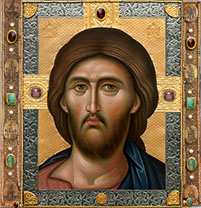 click here for icons of christ
click here for icons of christ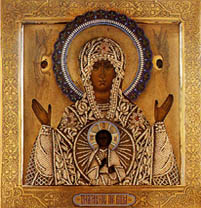 click here for icons of the theotokos
click here for icons of the theotokos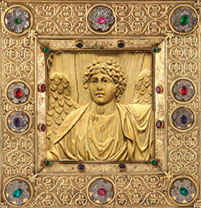 click here for icons of angels
click here for icons of angels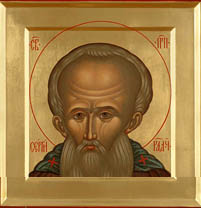 click here for icons of saints
click here for icons of saints








